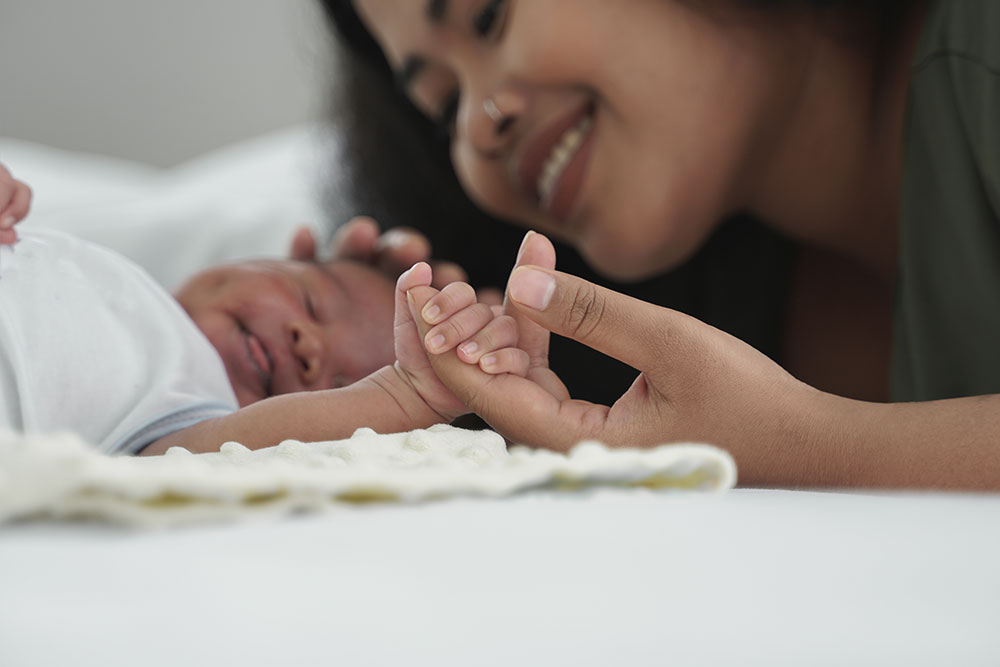7 Ways To Feel Better as a New Mom

Take care of yourself so that you can take care of your new baby.
Medical Expert: Jennifer Lincoln, MD, OB-GYN
Adjusting to motherhood is incredibly overwhelming. When you’re being pulled in so many directions and running on little-to-no sleep, it doesn’t take long until you might feel it’s getting the best of you—but it doesn’t have to be that way. Here are some suggestions to help you find balance, maintain more of your sanity, and step into your new role as a parent with less tension.
Take Time To Recover From Labor and Delivery
We’re starting here because this is so important. Many moms are eager to get back to their routines following birth, but it’s necessary to give your body time to heal before you start tackling those piles of laundry or venturing to the grocery store. “Even after a quick and easy delivery, allowing yourself time to recover is crucial,” shares Jennifer Lincoln, MD, OB-GYN, medical director at Providence Portland Medical Center and medical advisor for Flo Health.
It’s not only imperative for your physical well-being, Dr. Lincoln reminds, “Emotionally you are adjusting, too, so it’s important to offer yourself the space to settle into your new role.” She recommends lowering your housekeeping expectations, getting as much sleep as you can, and listening to your body’s cues for how much is too much. One way to do this is by monitoring your flow of lochia, the vaginal discharge made up of blood, mucus, and uterine tissue you have after birth. A sudden increase in flow or change in color (look for a brighter red associated with a menstrual period) may indicate too much physical activity, as can pressure in the vagina or a general sense of feeling worn out. Not overdoing it will actually allow you to heal more quickly, meaning you’ll be back in the swing of things faster than you’ll be if you try to deep-clean the kitchen or sneak a workout before you’re ready.
While recovery time varies from person to person and birth to birth, most new moms can resume light household chores within a week or so (perhaps longer if they’ve had a C-section), and some are even able to begin light exercise, such as walking, after only a few weeks. However, full recovery takes at least six weeks, and you should use that time to honor the rest you need and deserve. It’s full speed ahead from here!
Consider Breastfeeding
Here at Pregnancy & Newborn, we firmly believe that fed is best, but the fact is that there are some perks to breastfeeding that can positively impact your journey into parenthood and beyond. Nursing provides your baby with a wealth of benefits from improved immunity to a higher IQ, but it also comes with notable benefits for moms. Mothers who breastfeed run a lower risk of suffering from postpartum depression, have increased protection against certain types of cancer, and enjoy the benefits of prolactin, the milk-making hormone that is reported to have a calming effect on mothers.
Breastfeeding can also be more convenient in some ways. Although it can be tricky in the beginning for many moms, once you’ve found your stride, nursing can simplify days with your little one. There’s no preparing bottles or calculating how many you’ll need for a day out, baby’s food is always warm and readily available, and it can also be cost-effective—though we know being baby’s sole source of food and nutrition is a major sacrifice of time and personal space. If you need a break, it’s perfectly OK to pass baby off to your partner for a bottle (just be mindful of nipple confusion).
Embrace the Calm
Life with a newborn can be surprisingly quiet. You might not be as tempted to flip on the TV or scroll through your Instagram feed when a wee one is rocking in your arms—and that’s a good thing. A little quiet is good for the soul. In a world that’s buzzing with constant stimulation, being alone with our thoughts—and our babies—can offer moments of peace and clarity that are much needed during the early days of parenthood.
It’s also a great time to meditate if you don’t already. Apps like HEADSPACE take only 10 minutes a day and can work wonders for decreasing stress and improving mood—something every new parent could benefit from, if only as a preventative measure, or a tangible coping mechanism during stressful days.
Your baby will also thrive in a calm, peaceful environment. Quiet one-on-one time will give the two of you an opportunity to bond, which will provide long-term benefits for your baby that will positively impact their life. On your end, bonding will help you feel more in tune with your little one’s wants and needs, making you more comfortable and confident in your new role as a mom. Also, snuggling with and gazing into your baby’s eyes unleashes the feel-good hormone oxytocin, which will leave you riding an emotional high—and it won’t come crashing down when the moment is over. The connection will simply grow stronger each time.

Nourish Your Body
In addition to taking a prenatal vitamin during pregnancy, you likely were encouraged to adopt a nutrient-dense diet to ensure your baby was getting a great start. Now that your newbie has arrived, keep eating those fruits and veggies! If you’re nursing, it’s especially important to fuel your milk supply with what your baby needs, but even if you aren’t, staying fueled with good nutrition is imperative for your well-being.
For the first few weeks after baby arrives, you’ll likely rely on the kindness of others, any meals you froze while still expecting, and takeout. Once you’re able to get out and do your shopping (or have an order delivered), stock up on easy, nutrient-rich foods, and have a plan for what you’ll eat throughout the week. Bagged salads, pre-chopped fruits and vegetables, chicken breasts that can be thrown into a crock pot or pressure cooker, hard-boiled eggs, avocado spread on whole grain toast, and satiating snacks like trail mix or cheese sticks can provide sustenance without much additional prep or effort.
Eating a plethora of nutritious foods gives you more energy and boosts your brain for the full functioning capability of being a brand-new parent. Keep in mind that skipping meals will have a negative impact. So eat at least three times a day, even if you have to set your phone alarm to remind you to grab a sandwich.
Get Some Rest
It might be some months before you begin sleeping through the night, but it’s important to get as many Zs as you can when you can. That means catnapping during the day (you’ve heard it before: Sleep when the baby sleeps!) and crawling into bed early more nights than not. “The sleep deprivation that comes with having a newborn can make getting through the day hard,” Dr. Lincoln says.
If you absolutely can’t get any shuteye during the day, do your best to simply rest as much as possible. If you’re a working parent, you might need to stretch out on the couch and do nothing for a little bit when you get home. That’s OK! Everybody needs time to relax; a break will recharge you and make it easier for you to conquer the evening routine: dinner, bath, snuggles, and preparing for the next day. Don’t feel bad about napping or resting when you need to. You’ll be a better parent for it when you get up.
Breathe In the Fresh Air
Step outside on a nice day, and you’ll feel uplifted almost instantly. Soaking up the sun is the easiest way to get your daily dose of vitamin D, which helps boost your immune system, balance your hormones, improve your sleep quality, and more. Although catching your rays while moving (for example, taking a walk to your local park) is the best option, studies have shown that simply gazing at a natural scene activates parts of the brain associated with balance and happiness, making even a short sit on the stoop beneficial.
Keep It All in Perspective
In the world of parenting, some days are better than others. On the days that you’re desperate for a shower, your teething baby is miserable, and you just don’t think you can survive another sleepless night, try to remember: This too shall pass. Bad days don’t last forever.
However, it’s important to note that some feelings may point to possible postpartum depression or another mental health issue. If you have persistent feelings of sadness, hopelessness, worthlessness, anxiousness, or guilt don’t hesitate to ask for help. Talk to your OB or health care professional at or before your postpartum checkup.
Lastly, remember that if you expect full-time perfection, you’re going to be disappointed. The best way to stay grounded is to keep your expectations realistic: You don’t have to be a super mom. Your baby loves you just because you’re you … and it’s best for both you and babe if you can feel your best (or at least as close as possible) every day.







